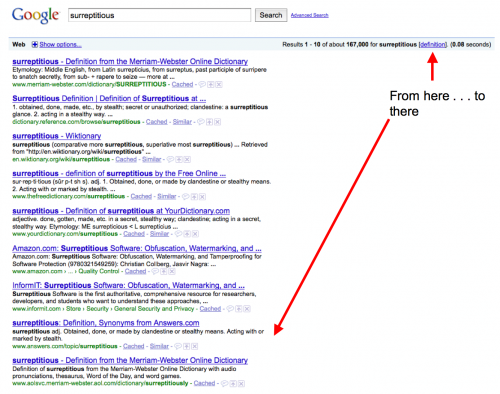Answers.com Loses “Pole Position” To Google Dictionary
Answers.com has a strong URL (if not a brand) and lots of traffic, more than 25 million monthly unique users. It was the source of definitions in the “definitions” link in the upper right of Google SERPs. The key word in that last sentence is “was.” As of yesterday, without fanfare, Google replaced Answers.com with […]
Answers.com has a strong URL (if not a brand) and lots of traffic, more than 25 million monthly unique users. It was the source of definitions in the “definitions” link in the upper right of Google SERPs. The key word in that last sentence is “was.”

As of yesterday, without fanfare, Google replaced Answers.com with its own dictionary. This will be an interesting test of Answers.com’s strength and resilience. It will undoubtedly loose considerable traffic (how much is the question). And because it’s ad supported that will mean a corresponding loss of ad revenue. Furthermore Answers.com is a public company and we’re likely to see its shares decline, I would imagine, as investors discover this change and sell.

The new Google dictionary actually offers a better user experience and some nice features, such as recent searches which are tied into overall Google web search history.
We’ll see how much Answers.com suffers but it’s another cautionary tale for publishers that rely too heavily on traffic from Google. Brand matters.
Contributing authors are invited to create content for Search Engine Land and are chosen for their expertise and contribution to the search community. Our contributors work under the oversight of the editorial staff and contributions are checked for quality and relevance to our readers. The opinions they express are their own.
Related stories
New on Search Engine Land